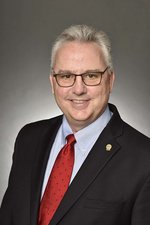Georgia Authorizes Electric Cooperatives to Deliver Rural Broadband
Wednesday, December 11, 2019
Digital Beat
Georgia Authorizes Electric Cooperatives to Deliver Rural Broadband
A shorter version of this article first appeared in Georgia Magazine, the official monthly publication of Georgia EMC

What's happening with rural broadband? Hundreds of thousands of Georgians have been asking this question for several years now. These voices are being heard, as lawmakers in Atlanta and Washington (DC) have launched several rural broadband initiatives.
Defining the Problem
My daughters in middle school know they’ve got to define a problem before it can be solved. Unfortunately, the Federal Communications Commission (FCC), which is responsible for producing and maintaining accurate broadband maps, earns a failing grade.
FCC maps, which use data submitted by current service providers, have been grossly overstating the areas considered “served” by broadband providers. Why are the FCC maps important? Simply put, federal funds for rural broadband have been distributed using the FCC’s flawed maps. It’s no wonder that rural broadband access is such a mess. Thankfully, Georgia is leading the way nationally in defining the broadband problem with new, accurate maps.
Under pressure from Congress, the FCC recently started a process to revamp its maps, but it could be another two to three years before completion.
Deana Perry, executive director of the Georgia Broadband Deployment Initiative (GBDI), recently testified to state lawmakers that a detailed broadband map showing areas served in Georgia will be completed by June 30, 2020. Georgia’s General Assembly passed legislation in 2018 requiring the GBDI to produce broadband maps which define a census block as served only if at least 80% of service locations in the census block have 25/3 Mbps service readily available. Georgia’s mapping initiative identifies census blocks with =>20% unserved locations, which significantly increases the number of unserved census blocks and locations when compared to the FCC’s current broadband map where only one location with access to 25/3 service deems an entire census block as served.

Funding
Without accurate maps that define the problem, it’s almost impossible to devise programs to address it or to provide reasonable estimates of how much it will cost to bridge the digital divide. Some cost models suggest the price tag could far exceed $1 billion in Georgia alone. Recent progress on the funding front includes:
- The GBDI has developed the framework for a broadband grant program, and state lawmakers will soon be considering initial funding for this new program.
- The U.S. Department of Agriculture (USDA) began accepting applications this year for its $600 million pilot rural broadband initiative, ReConnect, and has received applications requesting more than $1.4 billion. A second round of applications for an additional $550 million in ReConnect funding will begin early next year.
- The 2018 Farm Bill authorized $350 million/year (2019 – 2023) for a combination of USDA loans and grants for rural broadband projects in underserved communities.
- The FCC recently announced plans for a $20 billion rural broadband program, the Rural Digital Opportunity Fund, which should be launched by the end of 2020.
Electric Cooperatives Authorized to Consider Broadband Options
Gov. Brian Kemp (R-GA) signed Senate Bill 2 (SB 2) on April 26, 2019, authorizing electric membership cooperatives (EMCs) to provide broadband services. Being a retail broadband provider may not be feasible for many EMCs, but SB 2 also provides all EMCs greater latitude to leverage their own infrastructure—power lines and rights of ways, etc.—to help remove barriers to broadband deployment for other service providers.
Thanks to the passage of SB 2, EMCs have taken significant actions in just the past few months:
- EMCs led or supported three of the seven USDA ReConnect applications from Georgia and eagerly await USDA’s decision.
- EMCs initiated or are evaluating feasibility studies or other ways to advance broadband deployment.
We know it’s frustrating for those who suffer from no or inadequate service. But take heart, rural Georgia: Significant progress is being made, although patience will be required as steps are taken to bridge the digital divide. Stay informed at garuralbroadband.com.
Bill Verner is Senior Vice President with Georgia Electric Membership Corp., a statewide trade association representing 41 electric cooperatives in Georgia, Oglethorpe Power Corp., Georgia Transmission Corp. and Georgia System Operations Corp.
The Benton Institute for Broadband & Society is a non-profit organization dedicated to ensuring that all people in the U.S. have access to competitive, High-Performance Broadband regardless of where they live or who they are. We believe communication policy - rooted in the values of access, equity, and diversity - has the power to deliver new opportunities and strengthen communities.
© Benton Institute for Broadband & Society 2019. Redistribution of this email publication - both internally and externally - is encouraged if it includes this copyright statement.
For subscribe/unsubscribe info, please email headlinesATbentonDOTorg






